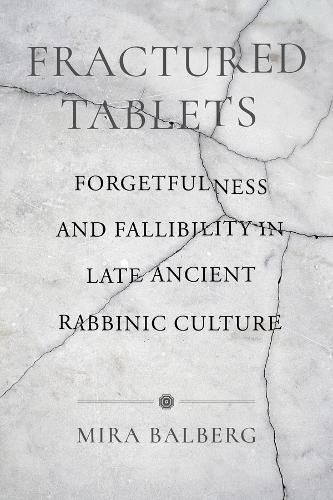Readings Newsletter
Become a Readings Member to make your shopping experience even easier.
Sign in or sign up for free!
You’re not far away from qualifying for FREE standard shipping within Australia
You’ve qualified for FREE standard shipping within Australia
The cart is loading…






A free ebook version of this title is available through Luminos, University of California Press's Open Access publishing program. Visit www.luminosoa.org to learn more.
This book examines the significant role that memory failures play in early rabbinic literature. The rabbis who shaped Judaism in late antiquity envisioned the commitment to the Torah and to its commandments as governing every single aspect of a person's life. Their vision of a Jewish subject who must keep constant mental track of multiple obligations and teachings led them to be very preoccupied with forgetting: forgetting of tasks, forgetting of facts, forgetting of texts, and-most broadly-forgetting the Torah altogether. In Fractured Tablets, Mira Balberg examines the ways in which the early rabbis approached and delineated the possibility of forgetfulness in practice and study and the solutions and responses they conjured for forgetfulness, along with the ways in which they used human fallibility to bolster their vision of Jewish observance and their own roles as religious experts. In the process, Balberg shows that the rabbis' intense preoccupation with the prospect of forgetfulness was a meaningful ideological choice, with profound implications for our understanding of Judaism in late antiquity.
$9.00 standard shipping within Australia
FREE standard shipping within Australia for orders over $100.00
Express & International shipping calculated at checkout
A free ebook version of this title is available through Luminos, University of California Press's Open Access publishing program. Visit www.luminosoa.org to learn more.
This book examines the significant role that memory failures play in early rabbinic literature. The rabbis who shaped Judaism in late antiquity envisioned the commitment to the Torah and to its commandments as governing every single aspect of a person's life. Their vision of a Jewish subject who must keep constant mental track of multiple obligations and teachings led them to be very preoccupied with forgetting: forgetting of tasks, forgetting of facts, forgetting of texts, and-most broadly-forgetting the Torah altogether. In Fractured Tablets, Mira Balberg examines the ways in which the early rabbis approached and delineated the possibility of forgetfulness in practice and study and the solutions and responses they conjured for forgetfulness, along with the ways in which they used human fallibility to bolster their vision of Jewish observance and their own roles as religious experts. In the process, Balberg shows that the rabbis' intense preoccupation with the prospect of forgetfulness was a meaningful ideological choice, with profound implications for our understanding of Judaism in late antiquity.